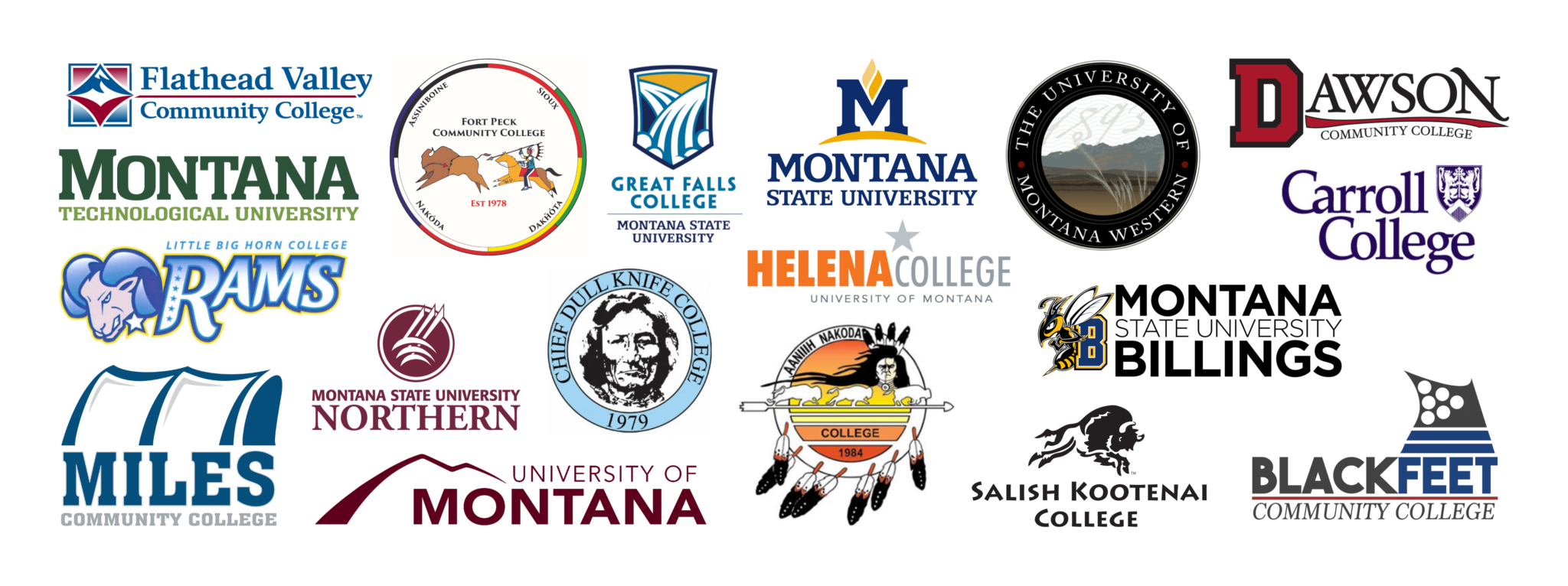Aaniiih Nakoda College provides quality post-secondary education for residents of the Fort Belknap Indian Reservation and surrounding communities. The college promotes individual and community development by maintaining and revitalizing the indigenous lifeways of the Aaniinen and Nakoda Tribes and by preparing students to succeed in an American technological society.
Blackfeet Community College is operated exclusively for non-profit purposes to provide post-secondary and higher educational services to the community, and to provide cultural, social and recreational services that are sensitive to the varying community needs.
Carroll College is a private, Catholic, liberal arts and preprofessional college in Montana’s capital city of Helena. Carroll College has earned top national and regional awards for its academic programs, including its flagship biology, civil engineering, nursing, and mathematics departments. In volunteer service work, Carroll students have won national and international recognition from organizations including St. Jude Children’s Research Hospital, Engineers Without Borders, Rotary International and the American Society of Civil Engineers.
Chief Dull Knife College is a community based, land grant, and tribally controlled community college established to provide quality educational opportunities to residents of the Northern Cheyenne Reservation and surrounding communities. Inspired by Chief Dull Knife’s determination, Chief Dull Knife College’s mission is to provide Northern Cheyenne with a culturally influenced education through quality life-long learning opportunities.
Dawson Community College is committed to creating and continuously improving opportunities for students to: DISCOVER their world in excellent academic programs, CONNECT with others through campus and community activities, and CONTRIBUTE to a relevant educational and lifelong learning experience.
Flathead Valley Community College is accredited by the Northwest Commission on Colleges and Universities. Since 1967, FVCC has promoted excellence in lifelong learning, focused on student success and community needs.
Fort Peck Community College is a tribally controlled community college chartered by the Fort Peck Assiniboine and Sioux Tribes. FPCC serves the people of the Fort Peck Reservation and northeastern Montana as a medium of Indian awareness enabling increased self-awareness.
Great Falls College‘s mission is to foster the success of their students and communities through innovative, flexible learning opportunities for people of all ages, backgrounds, and aspirations resulting in self-fulfillment and competitiveness in an increasingly global society.
Helena College, University of Montana, a comprehensive two-year college, provides access to and support of lifelong educational opportunities to their diverse community.
Little Big Horn College is dedicated to the professional, vocational, and personal development of individual students for their advancement in higher education or the workplace and inspiring Crow and American Indian Scholarship. The College is committed to the preservation, perpetuation, and protection of Crow culture and language, and respects the distinct bilingual and bicultural aspects of the Crow Indian community. Little Big Horn College is committed to the advancement of the Crow Indian family and community building.
Miles Community College prepares students for success and provides opportunities for lifelong learning through quality programs, community outreach, and partnerships.
Montana State University, the State’s land-grant institution, educates students, creates knowledge and art, and serves communities, by integrating learning, discovery, and engagement. MSU strives to be the university of choice for those seeking a student-centered learning environment distinguished by innovation and discovery in a Rocky Mountain setting.
MSU Billings’ mission is to assure that all members of the university community reach their individual potential. MSU Billings provides a university experience characterized by: excellent teaching; Support for individual learning; Engagement in civic responsibility; Intellectual, cultural, social & economic community enhancement.
MSU-Northern, a teaching institution, serves a diverse student population by providing liberal arts, professional, and technical education programs ranging from certificates to master’s degrees. The university promotes a student-centered and culturally enriched environment endorsing lifelong learning, personal growth, and responsible citizenship. The university partners with a variety of community and external entities to enhance collaborative learning, provide applied research opportunities, stimulate economic development, and expand student learning experiences.
Montana Technological University’s mission is to meet the changing needs of society by supplying knowledge and education through a strong undergraduate curriculum augmented by research, graduate education, and service.
Salish Kootenai College’s mission is to provide quality postsecondary educational opportunities for Native Americans, locally and throughout the United States. The College will promote community and individual development and perpetuate the cultures of the Confederated Tribes of the Flathead Nation.
The University of Montana pursues academic excellence as demonstrated by the quality of curriculum and instruction, student performance, and faculty professional accomplishments. The University accomplishes this mission, in part, by providing unique educational experiences through the integration of the liberal arts, graduate study, and professional training with international and interdisciplinary emphases. The University also educates competent and humane professionals, as well as, informed, ethical, and engaged citizens of local and global communities; And provides basic and applied research, technology transfer, cultural outreach, and service benefiting the local community, region, state, nation and the world.
The University of Montana Western educates undergraduate students through immersive practices in their field of study, strives for continuous improvement, and achieves evidence-supported learning and achievement outcomes, in order to transform students and the greater community through experiential teaching and civic, environmental, and multicultural engagement.
